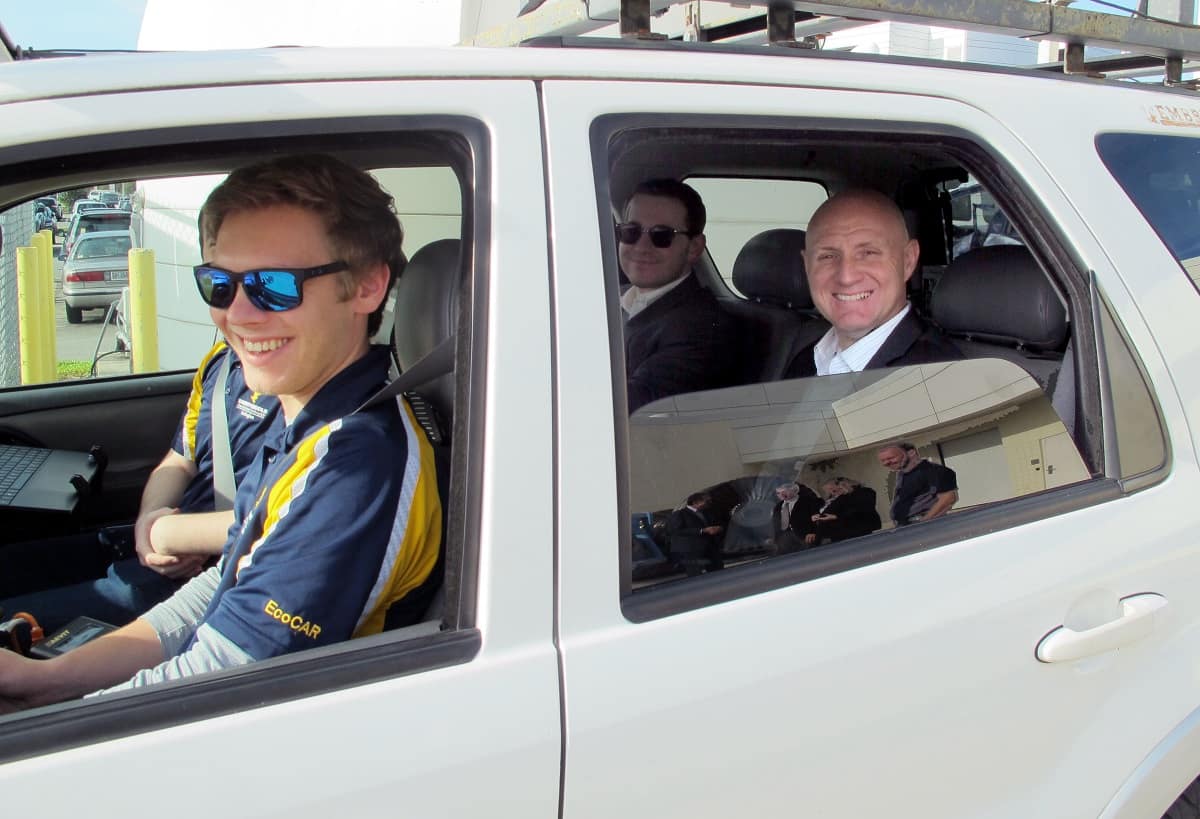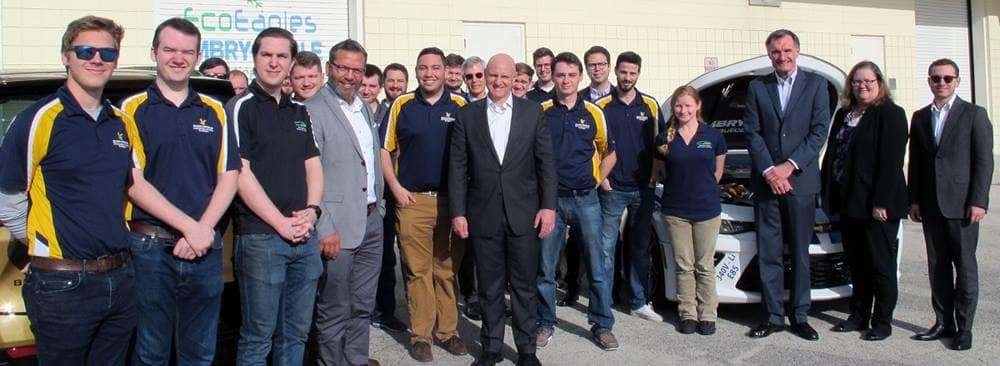US Department of Energy Official Lauds EcoEagles’ Work and Job Prospects

Student inventors recently got a boost when Daniel R Simmons, U.S. Department of Energy (DOE) Assistant Secretary for Energy Efficiency and Renewal Energy, stopped by Embry-Riddle’s Daytona Beach Campus to see the Green Garage and meet members of the EcoEagles Team.
During his campus visit, Simmons met with University President P. Barry Butler, and he also took time to cheer on Embry-Riddle students who are participating in the EcoCAR Mobility Challenge. A four-year competition, the EcoCAR Mobility Challenge spurs university teams to improve the energy efficiency, safety, and consumer appeal of a 2019 Chevrolet Blazer by leveraging advanced propulsion systems, and connected and automated vehicle (CAV) technologies. The competition is sponsored by the DOE, General Motors (GM), and MathWorks, and is managed by Argonne National Laboratory.
Such programs are “a great opportunity for the auto manufacturers to look for people to hire in the future,” Simmons told the EcoEagles. “That’s the purpose of you guys being here, to get jobs in the future.”
Robert Consolo, a Master’s student in Mechanical Engineering and project manager for the EcoEagles team, confirmed that his work on various energy-efficient cars has given him a competitive edge in the job market.
“EcoCAR has produced a lot of opportunities for me,” said Consolo, a New York City native who hopes to become an astronaut. “It’s why I want to get more and more involved. I’ve gotten numerous internships at Boeing, SpaceX and NASA, all because of my hands-on experience with EcoCAR. Employers love seeing people who can take the concepts they’ve learned in engineering classes and apply them.”

Embry-Riddle faculty, staff and student members of the EcoEagles team recently greeted visitors from the U.S. Department of Energy. (Photo: Embry-Riddle)
In November 2019, GM donated a Chevrolet Blazer and $280,000 in funding to kick off the Embry-Riddle EcoEagles’ second year of competition in the EcoCAR Mobility Challenge and their twelfth year overall competing in the EcoCAR competition series. The first year of the EcoCAR Mobility Challenge was focused on design and planning work. This year, the students are testing their designs to transform a powertrain engine so that it runs on hybrid power. They are also adding the sensors, computer hardware, and interfaces needed to give the vehicle connected and automated capabilities.
The students are using another vehicle to test their sensors and processing technologies. Currently, that car runs on a “drive-by-wire” scheme, explained students Alex Shiffer and Alex Bassett, who provided Simmons with a ride in the vehicle. “In drive-by-wire, you tell the computer what to tell the vehicle,” Bassett explained. “In fully autonomous driving, the computer tells the car what to do.”
The EcoEagles have performed well in competitions. In 2017, the team marked its fourth consecutive top-five finish in the EcoCAR competition. They also received two awards in 2018, when the EcoCAR 3 National Competition involved a Chevrolet Camaro, including top prize for the lowest well-to-wheel greenhouse gas emissions. In 2019, the team won in a number of different categories, taking home a First Place National Science Foundation Excellence in Connected and Automated Vehicles award.
CAV technology is about making driving safer and more efficient through autonomy, and by communicating with other vehicles (vehicle-to-vehicle, or V2V) and with the infrastructure (V2I), explained Dr. Charles Reinholtz, professor of Mechanical Engineering within the College of Engineering. “You will probably think about this the next time you are waiting at a red light when there is no crossing traffic,” he said. “That kind of inefficiency will not happen in the future because the light will know you are the only car, and it will turn green before you get there.”
The Embry-Riddle visit by Simmons was arranged by Connie Bezanson, Education and Outreach Manager of DOE’s Vehicle Technologies Office. Simmons was in town to make an announcement regarding DOE’s participation in the International Motor Sports Association’s (IMSA) Green Racing Program. DOE will join IMSA’s existing program partners, the U.S. Environmental Protection Agency and SAE International.

 Ginger Pinholster
Ginger Pinholster